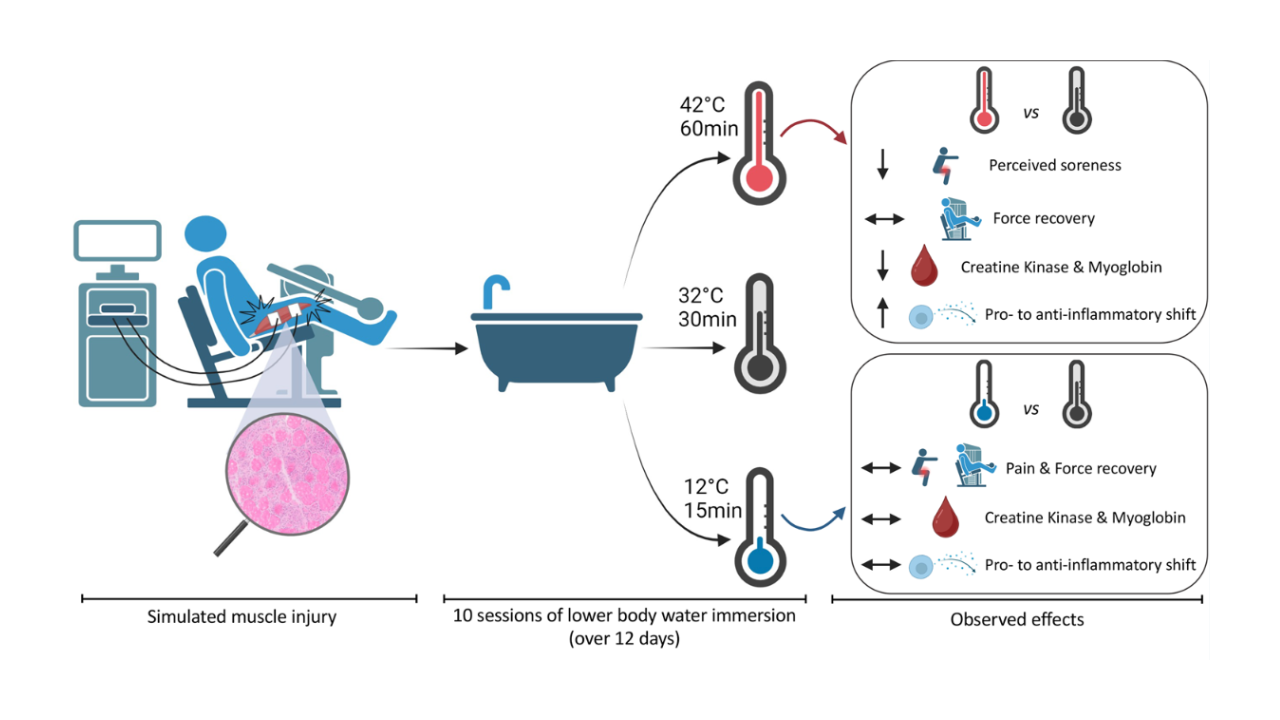Muscle injuries are common in both sports and rehab, and thermal therapies, especially ice, are a go-to treatment.
But are they effective for actual muscle regeneration, or are they just providing temporary pain relief?
This study employed a simulated muscle injury model in humans to directly compare the effects of cold versus hot water immersion on markers of muscle recovery and regeneration.
Does cold or hot water immersion improve muscle regeneration after injury?
What did the researchers do?
Researchers recruited 34 healthy, recreationally active men and induced large-scale myofiber necrosis using 200 eccentric contractions via electrical stimulation to the quadriceps.
Interventions
- CWI ➜ Cold water immersion (12°C for 15 min)
- TWI ➜ Thermoneutral (32°C for 30 min; sham control)
- HWI ➜ Hot water immersion (42°C for 60 min)
- Daily treatment for 10 days post-injury.
Measurements
- Muscle pain (VAS scale), maximal voluntary contraction (MVC), CK and myoglobin levels
- Muscle biopsies at baseline, Day 5, and Day 11
- Expression of proteins involved in inflammation (NF-κB, IL-10), heat shock (HSP27, HSP70), and protein synthesis (mTOR pathway).

What were the results?
Force Recovery
- No significant difference between groups in restoring strength (MVC).
Muscle Pain
- HWI led to significantly lower pain scores than TWI.
- CWI showed no benefit for soreness.
Blood Markers
- HWI lowered CK and myoglobin levels compared to CWI and TWI.
- CWI did not reduce these markers.
Heat Shock Proteins
- HSP27 and HSP70 significantly increased with HWI, not with CWI.
Inflammation Markers
- HWI upregulated anti-inflammatory IL-10 and suppressed pro-inflammatory NF-κB.
- CWI and TWI exhibited elevated NF-κB levels, indicating prolonged inflammation.
Angiogenesis and Protein Synthesis
- No major differences in VEGF or mTOR between treatments, though HWI showed favorable trends.
What does this mean?
- HWI enhances muscle regeneration by promoting early anti-inflammatory signaling and augmenting the heat shock protein response.
- CWI fails to aid regeneration and may even delay it by blunting necessary inflammatory and cellular repair processes.
- Strength doesn’t recover faster with either hot or cold, but pain and cellular markers improve more with heat.
Limitations
- Only male participants; results may not generalize to females.
- Short study window (11 days); it is unclear whether long-term outcomes would differ.
- Force production was measured isometrically only, not dynamically.
Coach's Takeaway
- Use heat (not ice) post-injury if the goal is actual regeneration, not just temporary relief.
- Cold may delay recovery by blunting inflammatory and regenerative signaling.
- Hot water immersion (42°C, 60 min daily) could be a game-changer for soft tissue rehab protocols.
I hope this was helpful.
Ramsey




